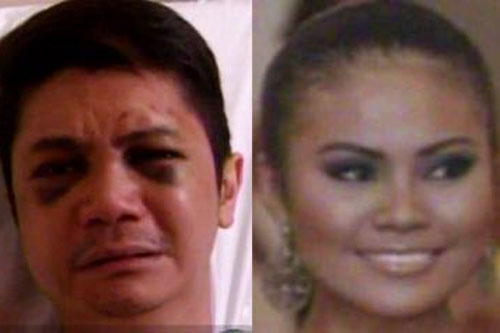Breaking
DOJ junks Cabanero rape complaint vs Navarro

(Left) Actor-Host Vhong Navarro at the hospital after mauling inside Denice Cornejo’s condominium; (right) Roxanne Cabanero, who claims to have been raped by Navarro
MANILA — The Department of Justice (DOJ) on Friday dismissed for lack of sufficient evidence the rape complaint filed by Roxanne Cabanero against actor-television host Ferdinand “Vhong” Navarro.
In a 12-page resolution, the DOJ said that Cabanero’s claims and story were “contradictory, suspicious and of doubtful nature.”
Cabanero alleged that Navarro raped her when she was an official candidate of the Ms. Bikini Philippines Pageant sponsored by Slimmers World from April 11, 2010 to May 5, 2010.
“First, complainant (Cabanero) admitted that when she boarded respondent’s car it was the first time that she introduced herself to respondent (Navarro). However, she alleged that when she went down from the hotel for respondent to pick her up, she was able to identify respondent’s car and she was even the one who approached his vehicle,” the resolution said.
“Thus, question arose as to how she was able to identify respondent’s car when it was only the first time that she introduced herself to him when she personally saw respondent was their guest in the latter’s noon time show and therefore, how could she easily identify respondent’s car,” it added.
The DOJ also had doubts about Cabanero’s statement that she had curfew hours as a candidate when she was “even the one who asked respondent to drive her around Metro Manila.”
It said that Cabanero failed to detail the manner by which Navarro allegedly sexually assaulted her and how she was able to allegedly put up her defense against him.
The DOJ said that Cabanero’s story did not add up, especially that some of her claims were improbable considering her location (at the front seat of the car), and considering that Navarro, at the supposed time, was unarmed.
“It may be argued that intimidation is very subjective and must be viewed in the light of the victim’s perception and judgment at the time of the commission of the crime and not by any outcry against an unarmed rapist when she had every opportunity to do so… This only casts doubt as to the veracity of complainant’s allegations as there was no clear indication how she struggled with respondent when he sexually violated her,” the resolution said.
As to Cabanero’s claims that Navarro picked her up at about 15 meters away from the lobby of the hotel she was staying with the other pageant candidates so as not to be recognized by other people, yet Navarro, according to Cabanero, dropped her off at the lobby after the alleged rape, the DOJ said these claims are “not only contradictory but also (defy) logic.”
Likewise, in the same DOJ resolution, it also dismissed Navarro’s perjury complaint against Cabanero for lack of sufficient basis “to support a finding that she made a willful and deliberate assertion of a falsehood” regarding the date of the alleged rape.
Navarro accused Cabanero of lying under oath as to the supposed date of the incident: April 24, 2010 from 11 p.m. up to 1 a.m. (April 25) since he had an out of town engagement at the time which made it virtually impossible for the alleged rape to have taken place.
In her defense, Cabanero said that nowhere in her complaint for rape did she state the exact date of the supposed assault because she could no longer remember it, and that it was only in an investigation form that she was asked to fill out did she “inadvertently” state the above-mentioned date.
Likewise, Cabanero said that the supposed rape could not have happened on April 25, 2010 since, at the time, the candidates were not yet billeted in the hotel in question.
In its resolution, the DOJ said the exact date of the alleged incident “was not the main fact subject of the inquiry” in the rape case, and “was not an element of the crime.”
“What appears is that the date is material only with regard to complainant’s (Navarro’s) defense,” it added.
The DOJ pointed out that in perjury, the statement in question must not only be false but also made in a deliberate manner.





















